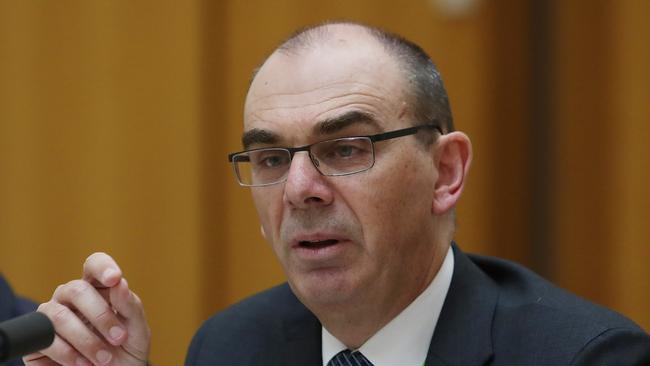Coronavirus crisis ‘increasing solvency pressures amid higher credit risks’, says APRA chairman Wayne Byres
Global economy outlook ‘highly uncertain’ after taking ‘some ferocious blows’, says financial services regulator.

The financial services regulator has painted a bleak picture of the COVID-19 crisis, warning solvency pressures are increasing amid higher credit risks, and that dividends would come under longer-term pressure.
APRA chairman Wayne Byres told an International Banking Federation meeting on Wednesday night that the global economy had taken “some ferocious blows, and the outlook remained “highly uncertain”.
“Banking systems, with the aid of central bank and government support packages, are helping damp rather than amplify the impacts of the economic shutdown,” Mr Byres said.
“But as much as we have all worked to overcome a torrid past few months, we also need to keep in mind that the real battles for the financial sector remain ahead.
“Measures to backstop liquidity have worked well and bought us time, but solvency pressures are mounting as credit risks come to the fore.”
The good news, according to the Australian Prudential Regulation Authority chief, was that the post-financial crisis reforms to the global financial system were playing their role as a shock absorber for the economy.
With the help of central bank and government support packages, banking systems were helping to damp the impact of the economic shutdown rather than amplify it.
“I cannot stress enough how important the continuity of essential financial services has been at a time of heightened anxiety within the community,” Mr Byres said.
“Like many places around the world, we saw that anxiety first hand as groceries were stripped from supermarket shelves.
“A fear of shortages quickly generated actual shortages.
“It was essential that concern about access to groceries did not translate into concern about access to money.”
No quick fix coming
It was important to recognise, however, that once the virus was overcome, the world would not simply pick up from where it left off in January.
The crisis would almost certainly trigger enduring change in the way society operated, with flexibility and agility the key to survival in the “long battle ahead”.
Mr Byres said financial and operational resilience – the core of prudential supervision – would be APRA’s main area of focus for the foreseeable future.
“That is not to say supervisory focus on other areas of interest – such as governance, culture, and remuneration – will go by the wayside,” he said.
“They are still important, and we will still pursue them.
“But supervisory resources inevitably need to be directed to the areas of greatest risk.”
‘Substantial’ threats
The APRA chief described the threats as “substantial”.
Capital management, in particular, would come under intense scrutiny as banks’ organic capital generation became more challenging.
While the regulator has already advised bank boards to cut or defer dividends, Mr Byres said it was reasonable to expect supervisory scrutiny of capital management and stress testing results would remain “very high” until there were clear signs of an economic recovery and banks were able to generate capital from retained earnings.
He also said the post-2008 reforms would be properly tested, and inevitably areas would be found where they could be improved.
“Before anyone misinterprets that comment, I am not advocating a watering down of the post-2008 reforms,” Mr Byres advised.
“It may in fact turn out they’re insufficient, and we need to do more.
“Maybe they just need to be reshaped a bit. I do not know. But inevitably there will be things we learn, and we should not allow a determination not to backtrack on reforms to deter us from improving them.”
Transparency more important
The APRA chief predicted that transparency would become even more important, as markets depended on information.
Accurate information, he said, was highly valued in times of uncertainty, with markets tending to “run first and ask questions later” if they lost confidence.
“We cannot afford that to happen. It is very important that we continue to promote transparency, and not be tempted to panic and switch the lights off in the mistaken view that it’d be better for everyone to operate in the dark,” he said.
“We do not want analysts, investors or rating agencies to overestimate the size of the problem by assuming the worst in the absence of information.
“Even without regulatory prompting, banks should err on the side of revealing more rather than less.”







To join the conversation, please log in. Don't have an account? Register
Join the conversation, you are commenting as Logout